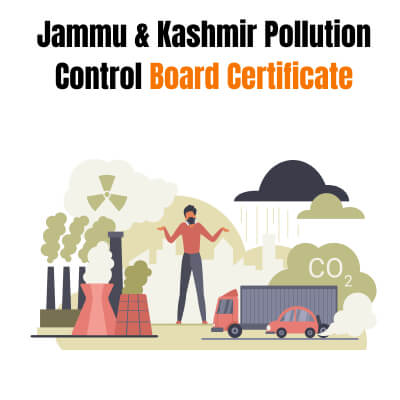
In Jammu and Kashmir, there's more to running a business than just opening a store and offering goods and services. It also entails making certain that none of your activities pollute the environment. Getting the Jammu and Kashmir Pollution Control Board (JKPCB) accreditation is an important step in this process. Businesses that have a substantial environmental impact must have this accreditation. We'll discuss which firms must apply for this certificate, why it's crucial, and how to get it in this blog article.
The regulatory body in charge of regulating and lowering pollution in Jammu and Kashmir is the JKPCB. To stop and manage pollution of the air, water, and land, the board establishes policies, norms, and practices. By ensuring that companies abide by environmental laws, it contributes to the preservation of the area's natural equilibrium.
The JKPCB certificate is not just a regulatory requirement; it plays a vital role in promoting sustainable business practices. Here are a few reasons why this certificate is important:
Not all businesses require a JKPCB certificate. The need for certification depends on the nature and scale of the business operations. Here are the categories of businesses that typically need to apply:
Manufacturing units are among the primary businesses that need JKPCB certification. These
units often produce significant amounts of waste and emissions that can harm the
environment. Some examples include:
Activities related to mining and quarrying have a noticeable and direct effect on the environment. They produce noise pollution, disturb the natural environment, and deforest. Companies engaged in these activities are required to get the JKPCB accreditation in order to guarantee that the appropriate environmental precautions are taken.
Large-scale construction projects, in particular, have the potential to seriously disturb the environment. Pollution of the air and noise are caused by land clearing, excavation, and heavy machinery use. To conduct business lawfully and responsibly, real estate developers and construction enterprises require JKPCB accreditation.
Biomedical waste is produced in hospitals and other healthcare facilities, and if it is not appropriately managed, it can be dangerous. Strict waste disposal laws must be followed by these establishments in order to protect the environment and the general public's health. They must therefore obtain a JKPCB certificate.
Hotels and resorts need to be as environmentally conscious as possible, especially if they are situated in environmentally delicate locations. Energy, water, and waste management are essential components of their operations. A JKPCB accreditation guarantees that these companies follow environmental regulations.
Waste oils, solvents, and other hazardous compounds are produced by auto repair shops. To avoid contaminating land and water, these wastes must be managed and disposed of properly. To guarantee that these service stations adhere to environmental regulations, they require JKPCB accreditation.
High-temperature operations used in pottery and brick kilns often emit pollutants into the atmosphere. To ensure they use pollution control methods and adhere to air quality regulations, these firms must get the JKPCB certificate.
Obtaining the JKPCB certificate involves several steps. Here’s a simple guide to help you through the process:
First, ascertain which category your company belongs to. Industries are categorized by the JKPCB into three categories: green (least polluting), orange (moderately polluting), and red (extremely polluting). Determining your category will assist you in comprehending the particular prerequisites and criteria that you must fulfill
Gather all necessary documents, which may include:
Submit your application along with the required documents to the JKPCB office or through
their online portal. Ensure that your application is complete and accurate to avoid delays.
JKPCB representatives will inspect your business location after receiving your application. They will evaluate your business practices to make sure environmental regulations are being followed.
If your business meets all the requirements, you will receive the JKPCB certificate. This certificate is typically valid for a specific period, after which you will need to renew it.
Acquiring the JKPCB certification is only the first step. Your company needs to continuously follow environmental standards in order to stay in compliance. It is imperative to conduct routine audits, dispose of garbage promptly, and put pollution control measures into action. Maintaining compliance over time can also be ensured by keeping up with any revisions or modifications to environmental legislation.
For Online Registration Visit: Jammu & Kashmir Pollution Control Board
To apply online to JKPCB, click HERE
For companies that have a big environmental impact, obtaining the Jammu and Kashmir Pollution Control Board certificate is crucial. This accreditation guarantees that your activities are sustainable and consistent with the law, regardless of whether you're running a manufacturing facility, a construction company, or a healthcare center. You can safeguard the environment and uphold your company's good name at the same time by being aware of the requirements and adhering to the application process.





We are the pioneers in offering environmental consulting services to our patrons, giving us the first mover advantage & keeping us ahead of our competitors.
Very experienced in filing, monitoring & issuance of CDSCO Certificates, Drugs Licensing, Environmental Impact Assessment, AERB certificates, Pollution Control Board CTE & CTO, Waste Management Authorization from State Pollution Control Boards, Fertilizers & Insecticides Licensing
